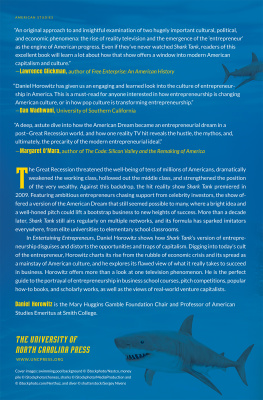Daniel Horowitz - Entertaining Entrepreneurs
Here you can read online Daniel Horowitz - Entertaining Entrepreneurs full text of the book (entire story) in english for free. Download pdf and epub, get meaning, cover and reviews about this ebook. year: 2020, publisher: The University of North Carolina Press, genre: Politics. Description of the work, (preface) as well as reviews are available. Best literature library LitArk.com created for fans of good reading and offers a wide selection of genres:
Romance novel
Science fiction
Adventure
Detective
Science
History
Home and family
Prose
Art
Politics
Computer
Non-fiction
Religion
Business
Children
Humor
Choose a favorite category and find really read worthwhile books. Enjoy immersion in the world of imagination, feel the emotions of the characters or learn something new for yourself, make an fascinating discovery.
- Book:Entertaining Entrepreneurs
- Author:
- Publisher:The University of North Carolina Press
- Genre:
- Year:2020
- Rating:3 / 5
- Favourites:Add to favourites
- Your mark:
- 60
- 1
- 2
- 3
- 4
- 5
Entertaining Entrepreneurs: summary, description and annotation
We offer to read an annotation, description, summary or preface (depends on what the author of the book "Entertaining Entrepreneurs" wrote himself). If you haven't found the necessary information about the book — write in the comments, we will try to find it.
Daniel Horowitz: author's other books
Who wrote Entertaining Entrepreneurs? Find out the surname, the name of the author of the book and a list of all author's works by series.
Entertaining Entrepreneurs — read online for free the complete book (whole text) full work
Below is the text of the book, divided by pages. System saving the place of the last page read, allows you to conveniently read the book "Entertaining Entrepreneurs" online for free, without having to search again every time where you left off. Put a bookmark, and you can go to the page where you finished reading at any time.
Font size:
Interval:
Bookmark:

Entertaining Entrepreneurs
REALITY TVS Shark Tank AND THE AMERICAN DREAM IN UNCERTAIN TIMES
DANIEL HOROWITZ

THE UNIVERSITY OF NORTH CAROLINA PRESS
Chapel Hill
Publication of this book was supported by a generous gift from VICKI & PORTER DURHAM.
2020 Daniel Horowitz
All rights reserved
Designed by Richard Hendel
Set in Utopia and TheSans
by Tseng Information Systems, Inc.
Manufactured in the United States of America
The University of North Carolina Press has been a member of the Green Press Initiative since 2003.
Cover images: swimming pool background iStockphoto/Nastco, money pile iStockphoto/choness, sharks iStockphoto/MediaProduction and iStockphoto/Nerthuz, and diver shutterstock/Sergey Nivens
Interior shark image iStockphoto/Nerthuz
Library of Congress Cataloging-in-Publication Data
Names: Horowitz, Daniel, 1938 author.
Title: Entertaining entrepreneurs : reality TVs Shark Tank and the American dream in uncertain times / Daniel Horowitz.
Description: Chapel Hill : The University of North Carolina Press, 2020. | Includes bibliographical references and index.
Identifiers: LCCN 2020013191 | ISBN 978-1-4696-5943-5 (cloth: alk. paper) | ISBN 978-1-4696-6260-2 (pbk.: alk. paper) | ISBN 978-1-4696-5944-2 (ebook)
Subjects: LCSH: Shark tank (Television program) | EntrepreneurshipUnited States. | American Dream. | Reality television programsUnited States.
Classification: LCC HB615.H67 2020 | DDC 791.45/72dc23
LC record available at https://lccn.loc.gov/2020013191
To the editors who made
it all possible: Peter Agree,
Chris Appy, Lew Bateman,
Tom Bender, Clark Dougan,
Lynn Dumenil, Abby Gross,
Helen L. Horowitz,
Robert Lockhart, Lucy Maddox,
Mark Simpson-Vos, and
Judy Smith
When I first watched the reality TV show Shark Tank, supposedly to take my mind off work, I was struck by its dramatic stories and captivating characters. However, when I set out to write this book, I came to feel that the muted skepticism I had often deployed in the past when encountering popular culture was not up to the task of assessing contemporary American entrepreneurship. To be sure, as a historian I believe that it is my obligation to comprehend the worldviews of those I write about on their own terms. Yet, as fascinated as I am with this television show, I find it highly problematic. Shark Tank presents a distorted picture of the world and relies on a skewed vision of American entrepreneurship. It hides the roles of workers, who help make so many enterprises possible. It minimizes and even obliterates the crucial role that the federal government plays in undergirding the success of so many corporations. It celebrates the American dream even as it leaves vague its nature. It treats matters of race, class, gender, and sexuality as little more than theatrical fodder. It hoists individualism and even ruthlessness to honored positions neither deserves.
As I delved into other representations of American entrepreneurshipin school competitions, university programs, other television shows, how-to books, memoirsI found many of them similarly problematic. Preparing students as early as the third grade to become entrepreneurs strikes me as inappropriate indoctrination. High school and college competitions too often take place in a vacuum that blocks out the many troubling elements that shape our society. The proliferation of entrepreneurial programs within universitiessupported by interlocking corporate, nonprofit, and government organizationsrepresents the more practical dimensions of STEMs increasing power in the curriculum. Though some scholarly writing on entrepreneurship is critical, that criticism usually appears within a naively celebratory framework that accepts the basic premises of contemporary American capitalism.
In researching and writing this book, I had to think about a series of fundamental changes I have witnessed in my lifetime: from the organization man to the entrepreneur; from the language of free enterprise to that of entrepreneurship; from the New Deal Keynesian order that dominated American life from the mid-1930s until the late 1960s to a newer neoliberal one. The former, whatever its imperfections, at its best entailed commitments by the federal government, corporations, and labor unions to provide many Americans a measure of economic security via wage growth and a robust social safety net that might even narrow the gap between rich and poor. On the other hand, neoliberalism rests on individual self-governance instead of communitarian obligations. In the world Shark Tank presents, creative disruption brings economic growth and social entrepreneurship takes the place of social welfare programs. In the pages that follow, I juxtapose this entrepreneurial vision with what I consider to be the accurate picture of American life that many social scientists and journalists have recently offeredone where insecurity, inequality, incarceration, racism, and the breakdown of communities play prominent roles.
Some might think that I am trying to provide information that will enable readers to become successful entrepreneurs. Although that is hardly my intent, I suspect that this book will teach not only the basics of entrepreneurship but also what pitfalls to avoid, practically but also, more importantly, ethically. Moreover, I hope that what one astute observer has called my performed neutrality does not hide my belief that Shark Tank and, more generally, contemporary American entrepreneurship cannot be allowed to obscure the very real problems tens of millions Americans face daily. There is much that is admirable in specific and transformative entrepreneurial enterprises. However, embracing entrepreneurship as the centerpiece of a social vision of what America is at present and can be in the future means forgetting alternative choices, ones that focus less on creative destruction and more on social justice.
On October 23, 2015, during season seven of the reality TV show Shark Tank, more than 6 million viewers watched J. D. Claridge, an aerospace engineer, and Charles Manning, a businessman with extensive experience managing software enterprises, offer five celebrity investorsthe Sharks for whom the show is nameda stake in xCraft. Founded in 2014, xCraft produces drones that can operate with more flexibility than those of many of its competitors. Claridge and Manning already had orders from a Kickstarter campaign. During the episode several Sharks clearly seemed taken with the xCraft pitch. Promising to invest their own money, they quickly bid up the value of the proposed deal to $6 million, three times the original ask. Sensing victory, Manning suggested a syndicate involving all five Sharks and asked for an even higher figure, $10 million. I smell greedy people, remarked Daymond John, an African American businessman whose empire began with the clothing line FUBU.

J. D. Claridge and Charles Manning pitch xCraft on October 23, 2015. Well before this, the seventh season of
Font size:
Interval:
Bookmark:
Similar books «Entertaining Entrepreneurs»
Look at similar books to Entertaining Entrepreneurs. We have selected literature similar in name and meaning in the hope of providing readers with more options to find new, interesting, not yet read works.
Discussion, reviews of the book Entertaining Entrepreneurs and just readers' own opinions. Leave your comments, write what you think about the work, its meaning or the main characters. Specify what exactly you liked and what you didn't like, and why you think so.












